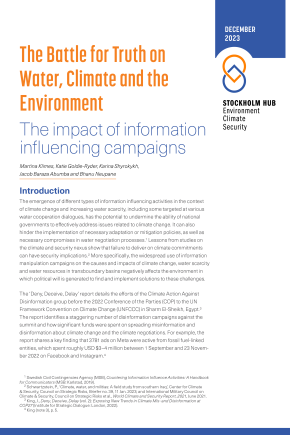The Battle for Truth on Water, Climate and the Environment: The Impact of Information Influencing Campaigns

Information manipulation related to climate and water can create security risks, increase polarization and erode trust in climate science, democratic principles and values. The widespread use of information manipulation campaigns on the causes and impacts of climate change, water scarcity and water resources in transboundary basins negatively affects the environment in which political will is generated to find and implement solutions to these challenges.
This policy brief identifies two cases of information manipulation in the context of climate and water: (a) water availability during the Russian aggression in Ukraine; (b) information manipulation in the context of transboundary negotiations and the role of social media from the Eastern Nile. Following the case studies, the brief focuses on the information landscape of climate- and water-related disinformation during armed conflicts.
Governments must treat water- and climate-related information influencing and manipulation as a serious security risk. The policy brief closes with recommendations for governments and multilateral organizations, to make societies more resilient to disinformation by focusing on education and communication. Scholars and experts need to increase understanding of the extent of the security risks posed by disinformation.
